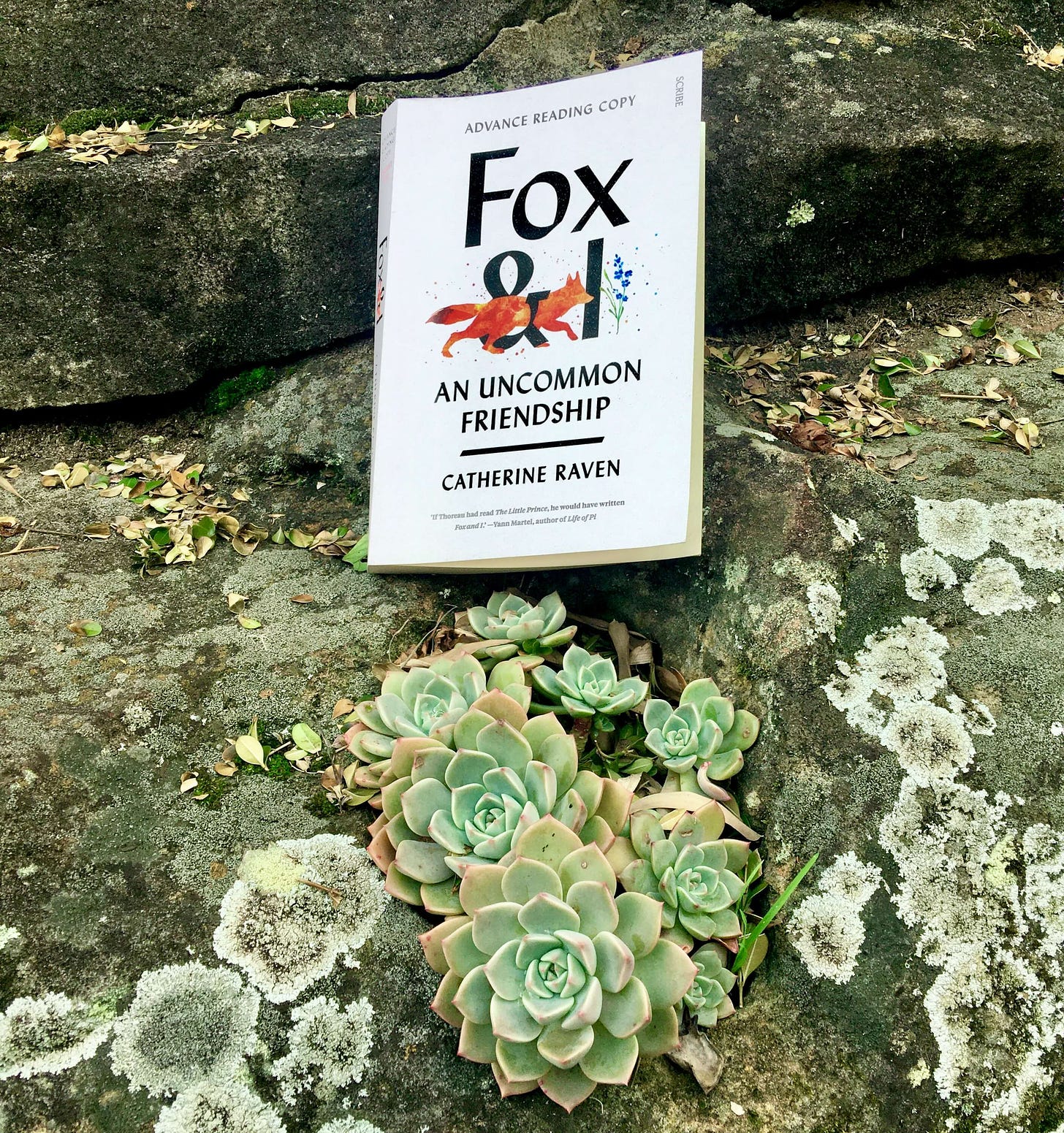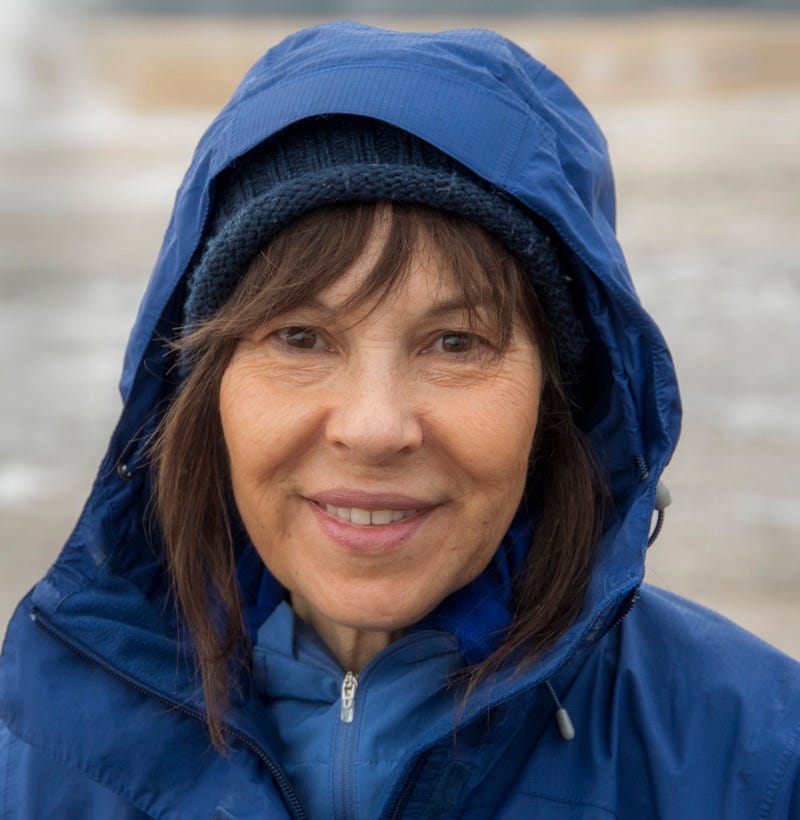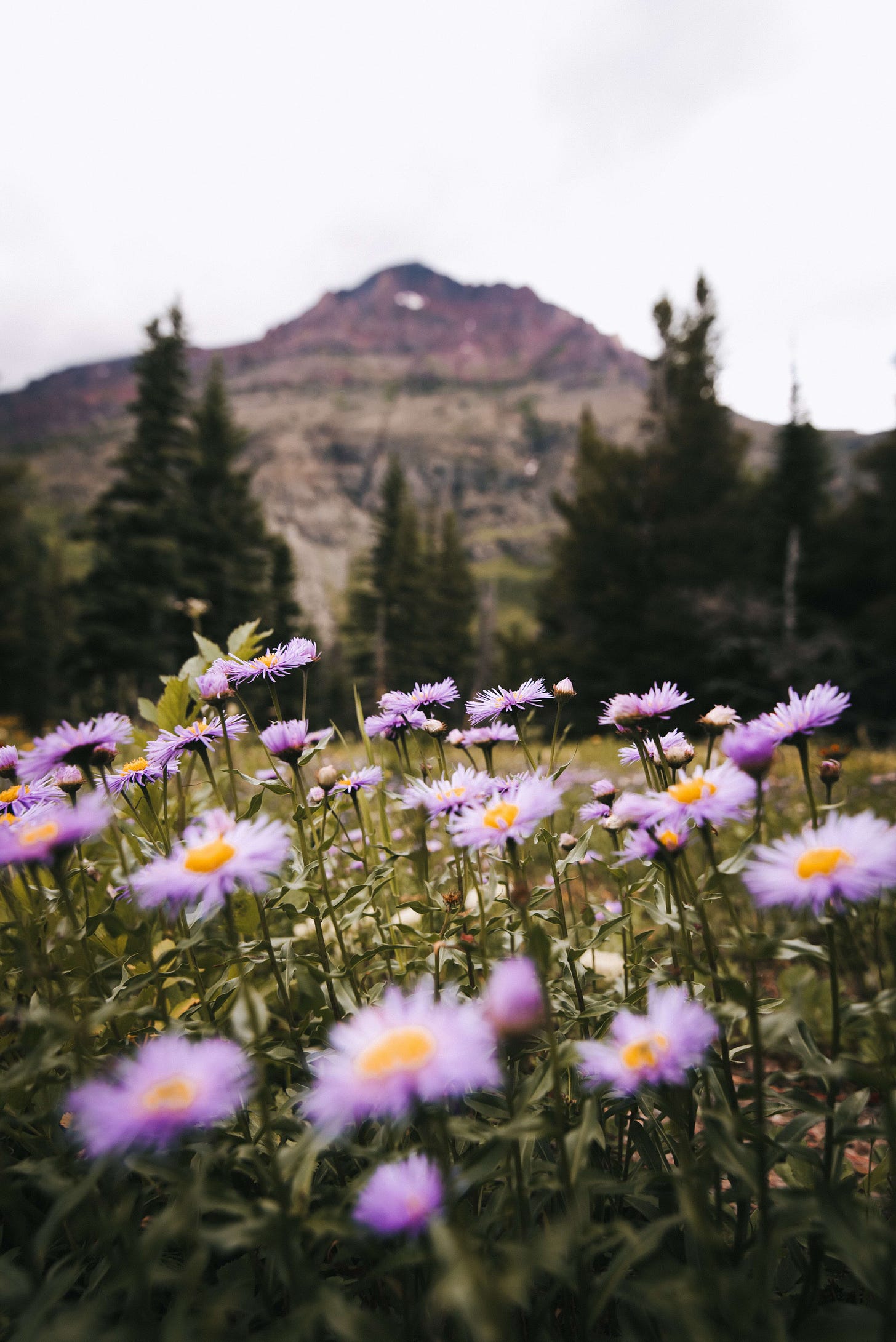Hi! I’m Hannah James, journalist, writer and editor, and this is where I review nature books, and think about nature-related topics out loud. Thanks for reading!
What I’m reading
Catherine Raven isn’t like other people. She lives alone on a remote piece of land in the Montana backcountry, “two miles up a gravel road in an isolated mountain valley and 60 miles from the nearest city”. She has a PhD in biology but doesn’t want to pursue academic life. She’s a former park ranger who’s always ready to move on, away from places or people.
“Disappearing into the woods saved me from questions that caused anxiety: where are your parents? Why are you all alone? Doesn’t anyone care about you?”
And so she has very few friends - until a fox starts turning up every day on her doorstep at 4.15pm on the dot, stays for 18 minutes and then lopes off, about his own business.

“Have I mistaken coincidence for commitment?” Raven asks herself, quite reasonably, but, regardless, begins to read to him to keep him entertained. She chooses Antoine de Saint-Exupéry’s The Little Prince. And soon we start to get interludes in the text written from the fox’s point of view. When his plans - for hunting, playing or fleeing - go awry, his expletive of choice is the phrase “weasel pee”.
All this risks being unbearably twee, but Raven’s solitary personality, scientific training and piercing intellect ensures she’s asking the same questions the reader is about this unusual friendship. (I can’t excuse “weasel pee”, though, I’m afraid.) And Fox’s presence in her life inevitably changes it dramatically.
There’s no shortage of memoirs like this - but I don’t think there’s one quite like this. Raven’s descriptions - born of long observation - of the land around her, its community of living things, and, of course, Fox himself are pin-sharp:
“He wears his coat like a straight-tailed Pomeranian. Alert and thick. In quiet, dry snow he leaps often and dives deep. When the rain is loud or the snow thick as cement, he shelters under a juniper canopy. He suffers a large potbellied magpie who nests in my juniper tree with unnecessary politeness… Regardless of the number of degrees below zero, Fox bustled around on the dry, calm, sunny days of winter. Wearing every hair perpendicular to his hide, he looked like a giant salsify seed head.”
She’s drily funny: of the mysterious criteria by which female elk choose their mates (DNA analysis has shown their calves are often sired not by the biggest, strongest, fiercest bulls, but by bulls that had lost fights or possessed undesirably small antlers), she notes:
“Maybe it’s because each cow chose, for herself alone, the one bull that would most displease her mother.”
And of her prolonged attempts to provide shelter for voles:
“Before you denounce my lack of judgement, ask yourself if you haven’t engaged in a lopsided relationship with an individual even more demanding and less likeable than a vole.”
The glimpses this book grants into her world are mesmerising. Of scoring a bulls-eye with her bow and arrow on a straw bale, she writes:
“I could have pretended to be a horseman thundering across a steppe behind Genghis Khan; the great Chiricahua chief Cochise moving effortlessly past shadows of towering saguaro; an 1800s voyageur paddling on Lake Kabetogama watching a six-point whitetail buck dappling beneath leaves of big-tooth aspen. I could have imagined myself as any other great bowman. I didn’t. When you are shooting a bow, the present moment is perfection: the pull of a single muscle, the silence of a held breath, the sting of the string on my left forearm.”

And she has plenty of penetrating insights on the subject of human relationships with wildness:
“Like a seesaw with humans on one side of the fulcrum and wildlife on the other, we sink further from a natural life and force wildlife closer to it. Our pursuit of the natural life is as vigorous as it is vicarious.”
Raven is uncomfortably aware of the charges of anthropomorphism that could be levelled against her, particularly as a scientist, for forming such an intense relationship with a wild creature. She alternates between being defensive about this habit of hers, and gleefully, amusingly, unapologetically anthropomorphising every creature she encounters.
She’s better when she does the latter - there’s an odd section describing a residential camp on which she lectures about wildlife to a group of continuing education students. She describes - and constructs cogent arguments against - her students’ deep hostility to the very idea of making friends with wild creatures, to the point where she feels bullied and almost afraid. This really pulled me out of the narrative. I found it astonishing that a group of professionals who were taking time out of their busy lives to learn about wildlife in a remote national park from a park ranger-turned-biologist would be quite so shocked and disgusted by their teacher having a fox for a friend. The repeated emphasis on this (to my mind, non-existent) taboo is so bizarre that I can only think either that, as a self-confessed social misfit, she’s misunderstanding the whole episode (which makes me doubt her judgement as a narrator), or that perhaps her editor was asking her to ramp up the stakes of her social exclusion for the sake of narrative tension. Or perhaps Americans really are hysterically opposed to the idea that animals might have emotions - I suppose I’ve never asked any.

The book is much more comfortable - as I suspect Raven herself is - when it’s just Fox and her, out in the backcountry, happily reading books or doing yoga stretches or going on moonlit expeditions together. On one particularly memorable night, he brings his kits to play with her.
“To my repertoire of memorised scenes - red berries the size of toad eyes; near-frozen cobalt-coloured ponds; pond-pocked meadows below fields of tall lupine - I added baby fox heads bobbing in grasses on a moonlit night. I would carry it as a talisman the way I carried any other memory. But unlike any other memory, in this image I wasn’t alone.”
I’m afraid I’ve just noticed this one isn’t out until next month (I got an advance copy from Scribe Publications - thank you Scribe!) so you’ll have to wait till then to read it. But it’s well worth the wait: tender and funny, sharply observed and powerfully evocative of the Montana high country and its creatures.
Fox & I: An Uncommon Friendship was book 51 for this year. I’ve also been reading Juliet Grames’s The Seven or Eight Deaths of Stella Fortuna.
Thanks again for reading! Feel free to hit reply to this email to have a chat (I always write back!), press the heart button if you liked this, or comment.
Also! Follow me on Instagram @hannahjameswords, on Twitter @hannahjamesword and check out my website at hannahjameswords.com.




